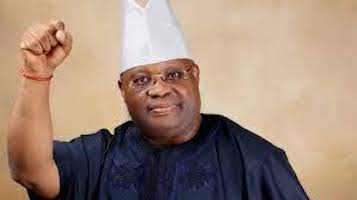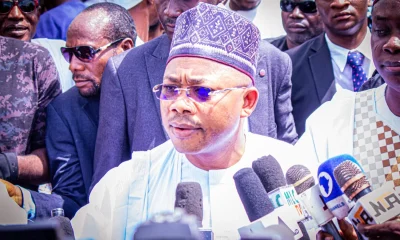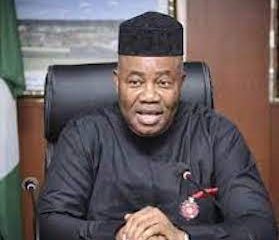NEWS
Fear and Fragility: How Safe are Nigerians?

By Dakuku Peterside
When dawn cracks open the Nigerian sky these days, the first breath many people take is heavy with questions that shouldn’t linger in a country as rich in potential as Nigeria. It used to be enough to worry about food on the table or the children’s school fees, but now an even more primal fear sits beside those old burdens: “Am I safe enough to see tomorrow?” Once upon a time, these worries were spoken in hushed tones only in the North-East, in places where Boko Haram and ISWAP turned towns into ghost settlements and farms into mass graves.
But now, fear has found new postcodes, new voices, and new victims. From wedding convoys ambushed on the road in Plateau to explosions rocking markets in Kano, from gun battles in Kaduna’s streets to soldiers ambushed in Niger State, the message is clear: the fear of sudden violence is no longer distant. It has become the air we breathe.Just in the last fortnight, a series of chilling incidents cut through every illusion that anywhere in Nigeria is truly safe. Benue is already a story of a killing field. Thirty-one travellers going from Kaduna to a wedding in Plateau were attacked on the road; twelve didn’t make it back alive, and the rest are scarred by a memory they will carry to their graves. In Borno’s Konduga village, mourners gathered to bury loved ones only to be ripped apart by suicide bombers — with over thirty dead in a single, devastating heartbeat.Kano, a city known for its industriousness and commerce, shuddered when a deadly explosion in Sabon Gari killed nine people and injured dozens more; a blast rumoured to be linked to illegal storage of explosives but symbolising something bigger: that even the places where business booms are just a spark away from tragedy.In Barnawa, Kaduna, people cowered behind locked doors as police exchanged fire with armed robbers in a broad daylight shootout that left the air thick with the smell of gunpowder. Niger State saw its horror when soldiers manning a checkpoint near Kontagora were ambushed and killed, and had their weapons stolen — evidence that the guardians themselves have become targets.These tragedies are not isolated dots on a tragic map; they form a pattern that millions of Nigerians have come to accept as the new normal. And that is where the real danger lies: when fear becomes familiar, hopelessness creeps in. But while the bullets and bombs make headlines, there is a quieter violence that maims just as deeply — the violence of economic insecurity.It sits in the market stall where a mother must decide what to buy when the naira in her purse has lost its worth overnight. It waits in the empty fields in Zamfara and Katsina, where farmers have fled because to tend crops is now to risk being kidnapped or killed. When you stitch the numbers together, you see a nation not just wounded but drifting on a tide of fear and uncertainty.It’s not only Nigerians who see this. A recent global survey by a Singaporean firm looked at 180 countries through the lens of safety and well-being. It measured nine key areas: personal safety, quality of life, cost of living, global peace, purchasing power, healthcare, property affordability, commute times, and employment rates. Nigeria didn’t make the top 100 places where citizens feel safe — neither physically nor financially.Our Quality-of-Life Index dropped from 5th to 6th in Africa in 2025, primarily due to a combination of runaway inflation, deteriorating infrastructure, and persistently high unemployment rates. The Global Peace Index ranks us 146th out of 163 countries. On healthcare, we lag embarrassingly far behind, with fewer than 0.4 doctors for every thousand people, while the global average stands at 1.6. Meanwhile, our Purchasing Power Index continues to decline as the naira loses value and prices spiral upward.Against this backdrop, President Tinubu took the rostrum of the National Assembly on Democracy Day and declared, “National security is the foundation of peace and progress. We have intensified security operations to reclaim communities from criminals and terrorists… our highways are safer, and we invest in technology and training to secure every inch of this country.” His government’s numbers are indeed impressive: N6.11 trillion — the most significant defence allocation in Nigerian history — was apportioned, from the record N54.99 trillion budget for 2025. He has initiated discussions on constitutional amendments for state policing and signalled his readiness to move policing to the Concurrent List.Yet, the gulf between appropriation and outcome is measured in graves, not spreadsheets. Within a week of the Democracy Day address, a suicide bomber blew apart market-goers in Konduga; within days, a mortar shell tore through a Kano factory; within hours of new “precision strikes” in Niger State, fourteen soldiers lay dead.Critics ask why, after two supplementary defence budgets and a raft of new commanders, bandits still dictate farming cycles, and kidnapping cartels still fix ransom prices. The AP’s report on the Benue massacre notes that Tinubu’s visit came days late and yielded no immediate arrests, fuelling accusations of a “react-don’t-prevent” doctrine. The bigger structural reforms — professionalised local policing, swift judicial processes, socio-economic buffers — remain promises in committee rooms, while communities improvise barricades.So, when people ask, “Are Nigerians safe?” the honest answer is that many aren’t — not from the gunman on the highway nor the slow violence of poverty that drains hope from the bones. This is why the core argument must ring loud: our leaders — local, state, and federal — must finally grasp that security is not just soldiers at checkpoints or more guns in the hands of the police.Security must be understood in all its dimensions. Economic insecurity is as dangerous as physical insecurity. A hungry nation will never be a peaceful nation; a country where 50 per cent of youth are unemployed or underemployed is not a country that can sleep with both eyes closed.National security underpins everything: peace, stability, the welfare of the people, the unity of the republic, and the sovereignty that many cherish on Independence Day. Without a sense of safety — that you can farm your land, run your shop, send your kids to school and expect them to come home — all talk of national pride becomes empty theatre.A strong economy is the very spine that holds up the shield of defence. If a country is to stand resilient against disruptions — from terror to inflation to pandemics — it must have the means to defend its people’s livelihoods as well as their lives.The broader consequences of ignoring this truth are already visible: investors pack their bags, youth find new homes across oceans, communities fracture into suspicion and blame, and the dream of unity becomes a political slogan rather than a lived reality.Families are displaced by violence and driven deeper into poverty. Social trust erodes when people see criminals roam free and the powerful escape consequences. Insecurity, whether it wears camouflage or a suit, flourishes when the state cannot deliver on its most basic promise: that people should live and work in peace and contentment.So, what should we do with this grim reflection? We can’t continue with ritual condemnations that dry up in press conferences. We must build a new understanding that security is a basket with many eggs: reforming security forces to protect, not exploit; investing in local intelligence and community policing, so that trust replaces fear; taming inflation with policies that don’t just favour the elite; reviving the economy by fixing roads, energising power supply, supporting farmers, and encouraging industries to absorb our restless youth.We need a healthcare system that works, schools that stay open and deliver real learning, and courts that convict criminals, regardless of their connections. Defence spending must be matched by transparent audits and a parallel surge in humanitarian and reconstruction funds, particularly for the farms and schools that violence has emptied. And the social compact must be rebuilt. Citizens who trust that the government will protect their pockets are likelier to share intelligence that protects their neighbours’ lives.This is not a one-person job. It is a task that calls on every Nigerian — leaders who must put self-interest aside, security agencies who must prioritise human rights, civil society who must continue pushing for accountability, and citizens who must hold those in power to their promises. Only then can we break this cycle where every dawn begins with the same whispered question, “Am I safe today?”We must create a Nigeria where that question fades and is replaced by the certainty that whether you are a farmer in Zamfara, a student in Maiduguri, a trader in Kano, a nurse in Kaduna, a trader in Onitsha, or a civil servant in Abeokuta, you can live, work and hope without fear.Safety must become more than a privilege for the few; it must be a birthright for all. Until we get there, we will continue to count the bodies, bury the dreams, and wonder what it will take to turn this fragile state of safety into something more substantial, something real, something truly Nigerian.Dakuku Peterside, a public sector turnaround expert, public policy analyst and leadership coach, is the author of the forthcoming book, “Leading in a Storm”, a book on crisis leadership.
NEWS
Gov Adeleke, Osun PDP Caucus Endorses Tinubu’s Re-election Bid

From Ayinde Akintade, Osogbo
Governor Ademola Adeleke of Osun State and the leadership caucus of the the ruling Peoples Democratic Party (PDP) in the state have endorsed President Bola Tinubu’s second term bid.They assured of working for the success of the re-election bid of the President, who is the National Leader of the All Progressives Congress, (APC) in the country.
They made this known on Monday at the Osun State PDP Leadership Caucus meeting held at the Government House, Osogbo. Similarly, following extensive consultations, debates, surveys, opinion sampling from traditional rulers, community leaders, civil servants, retirees, religious leaders, market men and women, interactions with members of the PDP and the general public across major towns and villages in Osun State, on issues pertaining to recent political development in the state, the Leadership Caucus of Osun PDP hereby reviewed as follows: “That all politics is local, and as such, the feelings and aspirations of voters and party members are critical to decisions on party affiliations.”That the majority of the members of the APC in Osun State are opposed to the APC, which did not originate from the Governor in the first instance. Some APC leaders based on entrenched interests have demonstrated hostility and resentment towards Governor Ademola Adeleke. Some went on social media and national television to call Governor Adeleke all kinds of unprintable names.”That the majority of PDP members in Osun State are not happy about the idea of the defection of Governor Adeleke to wherever he goes to show their love, support and loyalty to his leadership.”That the state governor, the state government, and the PDP as a political party remain very popular and acceptable above all other political parties in Osun State.”Consequently, the leaders hereby resolve as follows:”That the PDP in Osun State recognizes the fact that Osun State is the ancestral home of President Bola Ahmed Tinubu, which makes the President the son of Osun State. “Therefore, the PDP in Osun State hereby, adopts, and endorses President Bola Ahmed Tinubu for re-election in the 2027 Presidential election.”That PDP in Osun State re-affirm it’s adoption and endorsement of Governor Ademola Adeleke for re-election in the 2026 Governorship election on the platform of the PDP.”That Governor Ademola Adeleke and all members of the PDP in Osun State should remain in the PDP.”That the leadership of the PDP in Osun State is directed to disseminate the resolution to all structures of the party in the state and that, the state governor is enjoined to forge ahead with governance and implementation of the administration’s five point agenda.”NEWS
Kogi Promises to Reposition Basic Education System

From Joseph Amedu, Lokoja
The Kogi state government has promised to reposition its basic education system as part of its desire to enhance effective learning and providing solid foundation for Children’s education.The state’s Commissioner for Education, Wemi Jones gave the assurance during the 2025 matriculation ceremony of new students at the Kogi State study Centre of the National Teachers Institute (NTI) in Lokoja.
The Commissioner also restated government’s commitment to supporting initiatives aimed at providing quality education at all levels of learning. Jones emphasised the importance of teacher training, noting that the future of children lies in the hands of teachers.Represented by the ministry’s Acting Permanent Secretary, Omolayo Berikisu Onozare, Jones appealed to the matriculating students to remain committed to their academics.He highlighted Gov. Ahmed Ododo’s significant budgetary allocation to the education sector, stressing that the training of teachers cannot be compromised under any guise.The Director General and Chief Executive of NTI, Professor Sadiya Daura, said the institute’s programmes were designed to equip students with necessary skills for national growth and development.Represented by the Kogi State Coordinator of NTI, Alh Tijani Yusuf, Daura warned students against indiscipline, emphasising the institute’s zero-tolerance policy towards misconduct.She urged them to strive for impact in their lifetime after training.On his part, the Director News and Publications, Kogi State Ministry of Information and Communications, Dr Samuel Atuluku, expressed concern about the “get rich quick syndrome” among young people.Atuluku appealed to parents to ensure proper discipline of their children and wards to change the narrative and secure a greater future for them.The highlight of the ceremony was the administration of the matriculation oath to new students enrolled in NCE, Bachelor Degree, and Postgraduate Degree programs in Education.The event marked a significant milestone for the students, who are expected to benefit from the institute’s programs designed to equip them with necessary skills for national growth and development.NEWS
C’River, NIGCOMSAT Train 200 Youths on VSAT

By Ene Asuquo, Calabar
The Cross River State Government and the Nigerian Communication Satellite Ltd (NIGCOMSAT) through collaboration is training about 200 youths drawn across the 18 local government areas of the StateIn his remarks at the training workshop in ASUU building, University of Calabar, the Cross River State Governor, Prince Bassey Edet Otu who was represented by the Honourable Commissioner for Science, technology and Innovation Dr.
Justin Beshel, emphasized that the training of these youths on VSAT technology will advance technological development and create employment for the 200 youthsHe stressed that Cross River is shifting from being the civil service State to a digitally incline State, taking advantage in the demands in the global Space of technology, stating that the 200 youths were drawn from the 18 local government areas of the state through online registrationAccording to Beshel, “These youths are meant to be trained on Very Small Aperture Terminal(VSAT) and also in space technology”. He stressed further that there is a high demand of labour in this sector and the state is trying to catch- in to create the man power that is needed internationally, maintaining that partnering with NIGCOMSAT, “the youths are brought to be empowered through innovation in satellite technologyIn her opening address, the Managing Director, NIGCOMSAT, Jane Egerton- Idehen who spoke in the event through the programme Coordinator, Maureen Neekwe said the program in cross river is a groundbreaking initiative aimed at equipping young minds with cutting – edge knowledge in satellite technology and digital communicationShe emphasized that the program is designed to foster innovation, enhance technical skills, while creating opportunities for youths in the ever- evolving space – tech industryNeekwe maintained that participants in the workshop will gain practical experience in setting up and configuring VSAT systems.















